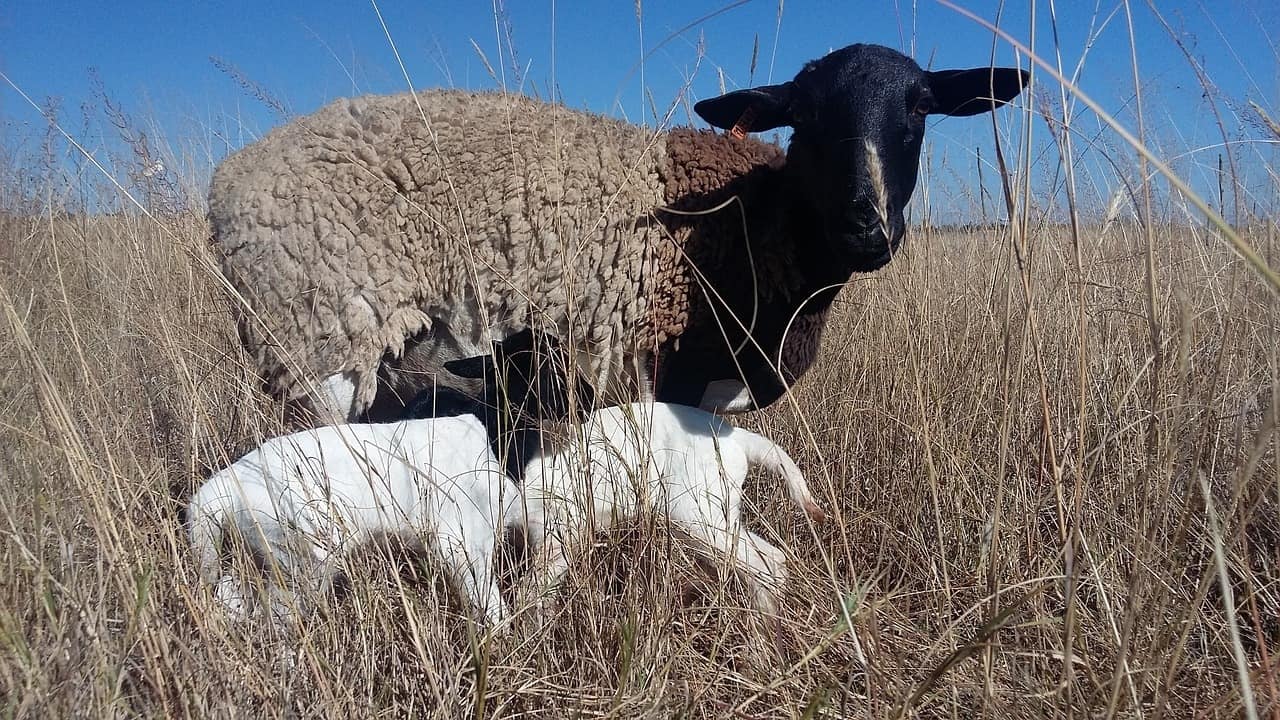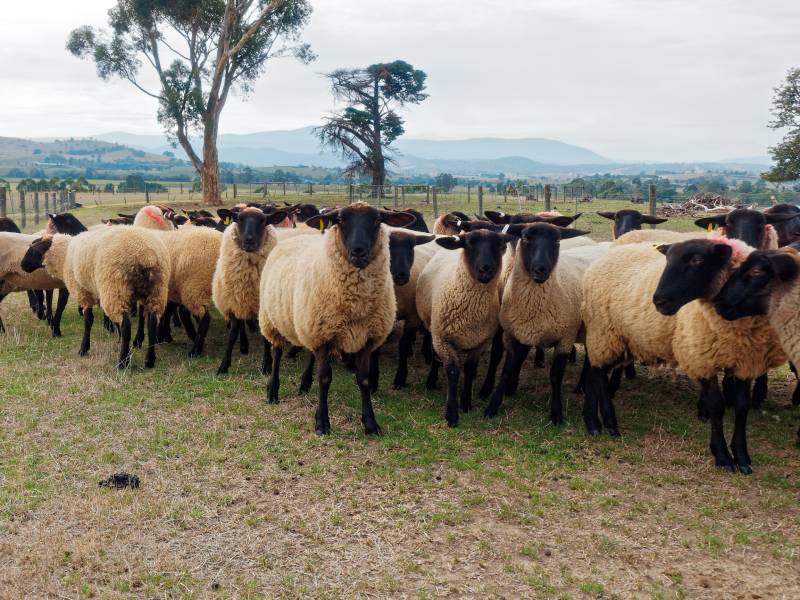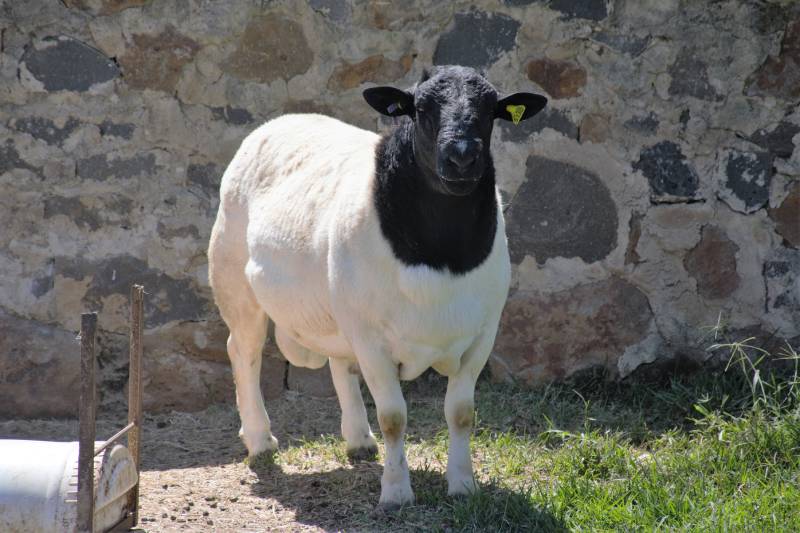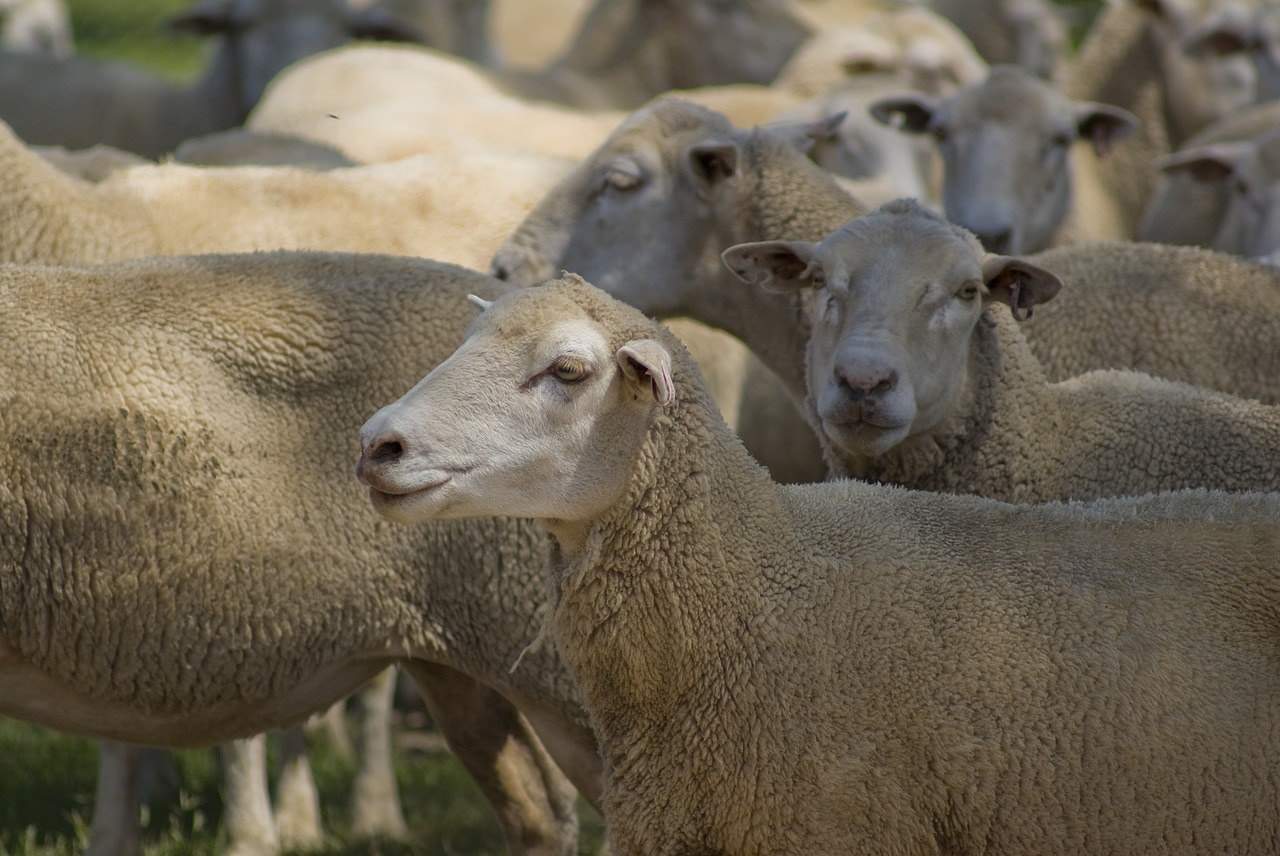The Dorper is a domesticated breed of sheep that is reared for meat. It is considered easy to care for with a short coat that sheds in late spring and summer. Developed in South Africa, it is the second most popular breed in the country.
It has been exported to other countries, including the USA, where it can survive in semi-arid conditions and has minimal care requirements. It is a hardy animal, does not require shearing or crutching, and is less prone to suffer from flystrike.

Quick Facts about Dorper Sheep
| Species Name: | Dorper Sheep |
| Family: | Bovidae |
| Care Level: | Minimal |
| Climate: | Semi-arid |
| Temperament: | Even-tempered |
| Color Form: | White with a black head |
| Lifespan: | 7 years |
| Size: | Large |
| Diet: | Grass, shrubs, bushes |
| Minimum Space: | ¼ acre |
| Compatibility: | Friendly |
Dorper Sheep Overview

The Dorper sheep was bred in South Africa in the 1930s. It was created by crossing the Dorset Horn with the Blackhead Persian. The name “Dorper” is an amalgamation of these two breeds. Other breeds, including the Van Rooy, also played a part in developing the current breed. The low-maintenance requirements and the hardy nature of the breed meant it gained in popularity and, in 1950, the Dorper Sheep Breeders Society of South Africa was formed.
Having been bred in South Africa, the breed is more than capable of dealing with semi-arid conditions, and it is less picky over its food than other breeds.
The Dorper has been exported to various countries and is popular in Australia. It even does well in the wet areas of New Zealand and Tasmania. It has been exported to the US as well as around Europe, thanks to its unique combination of beneficial features.
As well as being hardy and able to survive in almost any climate, the Dorper is fast-growing, reaches sexual maturity at a reasonably young age, and it has minimum requirements. It does not, for example, need shearing. The meat is considered milder than other breeds. This makes it popular in the US, where mutton-flavor is not popular, and this breed produces a lot of meat. The breed also has very thick skin to deal with the cold weather, and this makes it one of the most popular breeds for producing sheepskin.
Another beneficial feature of the breed is that its breeding is not seasonally limited. This means that a good manager can have his flock lambing throughout the year.

How Much Do Dorpers Cost?
The cost of Dorpers varies. Purebred Dorpers are less expensive than full blood, while Dorper and White Dorper cost around the same amount. Fullblood means that the sheep can trace its heritage directly back to South African stock. Purebred means that it is at least 93% Dorper genetics but has been upgraded from American stock. Expect to pay anywhere between $200 and $500 per Dorper. The usual economies of scale apply, so you might be able to enjoy lower prices if buying a full flock or a large number of Dorpers.
Typical Behavior & Temperament
Considered even-tempered sheep, Dorpers are easy to work with. Not only do they adapt to different conditions but will adapt to different people and characters. They are a good breed for beginners as well as experienced handlers, but they are a stocky breed and can be challenging to set up.
Appearance & Varieties

The Dorper sheep has a white body and a black head. It may also have some additional white coloring on the body. The White Dorper is all white. The two are considered identical, other than the coloring, so there is no preference when it comes to meat, rearing, breeding, or other factors. The difference is really a matter of personal taste for the breeders, although most herds are primarily made up of the black-headed Dorper.
The breed is hornless. Mature rams will weigh around 230 pounds, while mature ewes will usually weigh 200 pounds.
The Dorper has a combination of wool and hair, and it sheds every year, which means that it will not need shearing. This is one of the ways that this breed requires minimal work.
- Related Read: Lamb vs Sheep: What’s the Difference? (With Pictures)

How to Take Care of Dorper Sheep
Dorper Sheep are low-maintenance and they require minimal interaction and work, in exchange for a good amount of meat per carcass.
Non-Selective Grazing
The Dorper is considered a non-selective grazer. This means that they are not given the choice of what to eat, or which sections of a plant, and are expected to feed on the grass and plants in the vicinity. They can even be combined with Merinos in one herd. Merinos are considered good eaters that will graze on just about anything, and the Dorper is even less picky. They can be put out to graze on pastures that would otherwise be left unused, which means that they can convert a poor asset into a profitable field.
Climate And Conditions
They are hardy animals. Although the Dorper has been bred in semi-arid conditions, they will adapt to life in arid and harsh climates. They have also spread to wet and lush areas of New Zealand, where they have also flourished. Although they are hardy and can survive difficult conditions, they also do well in green pastures.
Land And Space
Try to ensure some shade for the sheep during summer months, and protection from the rain during winter. This protection can take the natural form of trees and canopies or a more stable shed. It is generally accepted that sheep require up to 20 square feet of shed per adult sheep. One acre of land will generally house between three and six sheep.
Do Dorpers Get Along with Other Pets?
The Dorper is considered an even-tempered sheep. This means that they will usually get along with people and other animals, although it also means that they have sensible respect for some animals. Sheep are herd animals, which means that your Dorper will do better in a flock than on its own, and you will need a flock of at least half a dozen sheep to ensure that they are happy. Sheep form very close bonds with one another and may even physically stick up for their close friends.

What to Feed Your Dorpers
Dorpers are non-selective grazers. Essentially, this means that they will eat whatever grass, hay, plants, and shrubs are in their field. This can be beneficial and even offers a means of turning unused fields into profitable pastures. It also means that you can combine Dorpers with other breeds that are more selective, leaving the Dorper to feed on what is left.
A lot of farmers have found that the breed responds better to fiber than grains and they will do well with good quality hay.
Sheep need up to 5 gallons of fresh water per day. This can be provided in buckets, troughs, stock tanks, or automatic waterers.

Keeping Your Dorpers Healthy
One of the reasons that the Dorper is such a popular breed is because they are hardy and healthy animals. They do, however, require the same care and maintenance as other breeds of sheep, to ensure they remain healthy and disease-free.
The Dorper is more tolerant of parasites than other breeds, and is not as prone to flystrike, either. It does require regular worming control, still, but the breed is a good choice if you are raising organic meat.
Breeding
Considered one of the most fertile of all sheep breeds, the Dorper can lamb at intervals of just 8 months, which means that you can achieve three litters every two years because the Dorper can breed at any time of year. The ewe is a good mother that is protective of her lambs and multiple births are fairly common in this breed. The excessive milk production of the ewe helps ensure early growth for your lambs. A young ram can service around 25 ewes while a mature ram can manage as many as 50 in 55 days.

Are Dorper Sheep Suitable For You?
Dorper sheep were first bred in South Africa and were bred to cope with the semi-arid climate of the region. They are shedders so do not require shearing; hardy, so are not prone to many illnesses or diseases; and they are non-selective grazers, which means that they will even graze on fields that would otherwise be left empty.
Although the breed does require the same care as others, the Dorper is not known to get ill. It is also not as prone to flystrike or parasitic infestation. Overall, this breed is considered a good choice for any breeder or farmer, regardless of experience, that is looking for a hardy and resilient meat stock.
Featured Image Credit: Pixabay
